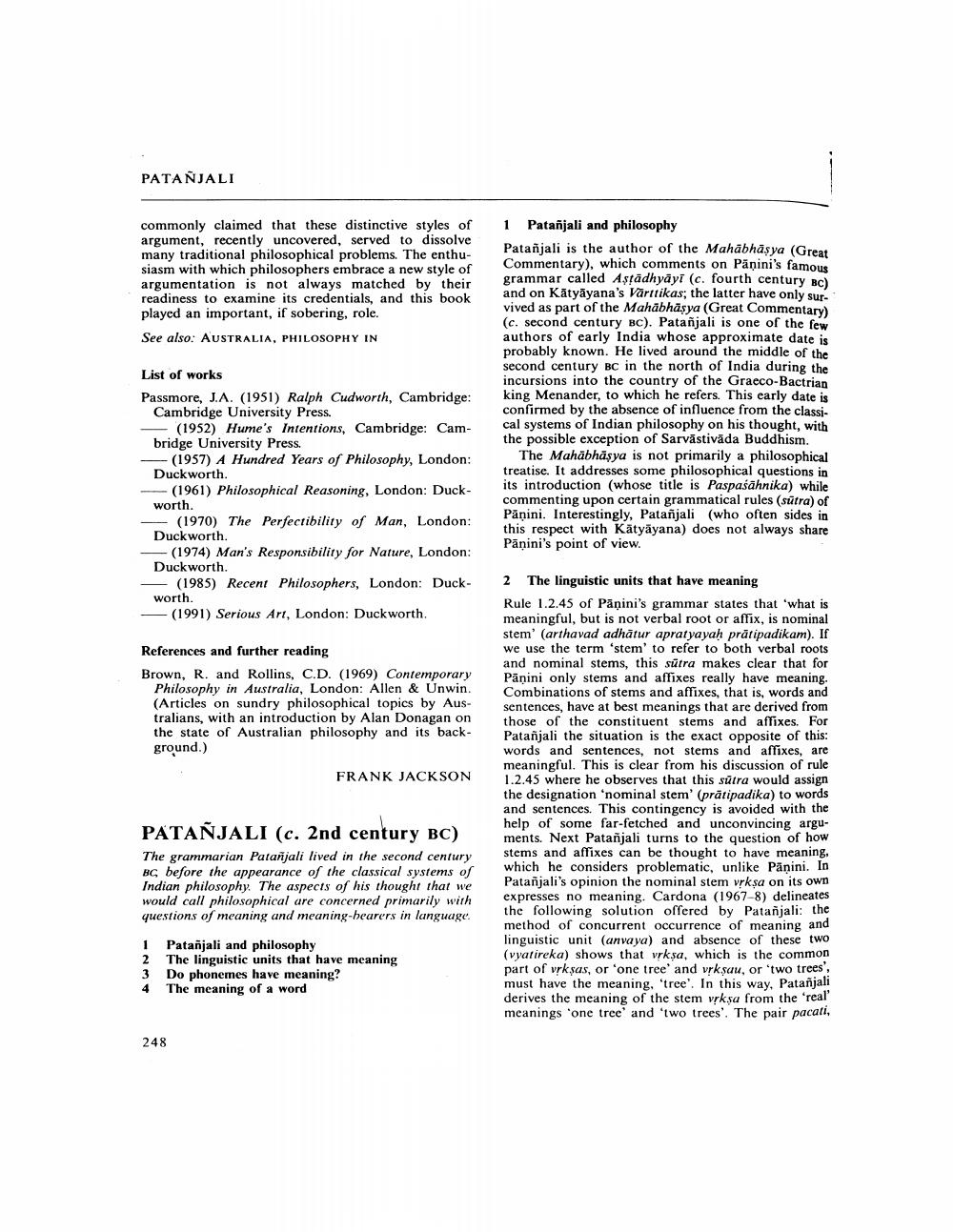Book Title: Patanjali Author(s): Johannes Bronkhorst Publisher: Johannes Bronkhorst View full book textPage 1
________________ PATANJALI commonly claimed that these distinctive styles of argument, recently uncovered, served to dissolve many traditional philosophical problems. The enthusiasm with which philosophers embrace a new style of argumentation is not always matched by their readiness to examine its credentials, and this book played an important, if sobering, role. See also: AUSTRALIA, PHILOSOPHY IN List of works Passmore, J.A. (1951) Ralph Cudworth, Cambridge: Cambridge University Press. - (1952) Hume's Intentions, Cambridge: Cam bridge University Press. --(1957) A Hundred Years of Philosophy, London: Duckworth. - (1961) Philosophical Reasoning, London: Duckworth. (1970) The Perfectibility of Man, London: Duckworth. (1974) Man's Responsibility for Nature, London: Duckworth. - (1985) Recent Philosophers, London: Duckworth. - (1991) Serious Art, London: Duckworth. 1 Patanjali and philosophy Patanjali is the author of the Mahābhāsya (Great Commentary), which comments on Panini's famous grammar called Astādhyāyi (c. fourth century BC) and on Katyāyana's Vārtikas; the latter have the latter have only survived as part of the Mahābhāsya (Great Commentary) (c. second century BC). Patanjali is one of the few authors of early India whose approximate date is probably known. He lived around the middle of the second century BC in the north of India during the incursions into the country of the Graeco-Bactrian king Menander, to which he refers. This early date is confirmed by the absence of influence from the classical systems of Indian philosophy on his thought, with the possible exception of Sarvāstivāda Buddhism. The Mahabhäsya is not primarily a philosophical treatise. It addresses some philosophical questions in its introduction (whose title is Paspašāhnika) while commenting upon certain grammatical rules (sutra) of Pāņini. Interestingly, Patañjali (who often sides in this respect with Kātyāyana) does not always share Pāņini's point of view. References and further reading Brown, R. and Rollins, C.D. (1969) Contemporary Philosophy in Australia, London: Allen & Unwin. (Articles on sundry philosophical topics by Australians, with an introduction by Alan Donagan on the state of Australian philosophy and its background.) FRANK JACKSON 2 The linguistic units that have meaning Rule 1.2.45 of Pāņini's grammar states that 'what is meaningful, but is not verbal root or affix, is nominal stem' (arthavad adhātur apratyayah prātipadikam). If we use the term 'stem' to refer to both verbal roots and nominal stems, this sūtra makes clear that for Panini only stems and affixes really have meaning. Combinations of stems and affixes, that is, words and sentences, have at best meanings that are derived from those of the constituent stems and affixes. For Patañjali the situation is the exact opposite of this: words and sentences, not stems and affixes, are meaningful. This is clear from his discussion of rule 1.2.45 where he observes that this sūtra would assign the designation 'nominal stem' (prātipadika) to words and sentences. This contingency is avoided with the help of some far-fetched and unconvincing arguments. Next Patañjali turns to the question of how stems and affixes can be thought to have meaning, which he considers problematic, unlike Pāņini. In Patanjali's opinion the nominal stem vrkṣa on its own expresses no meaning. Cardona (1967-8) delineates the following solution offered by Patanjali: the method of concurrent occurrence of meaning and linguistic unit (anvaya) and absence of these two (vyatireka) shows that vrksa, which is the common part of vrkşas, or 'one tree and vrk sau, or two trees, must have the meaning, 'tree'. In this way, Patanjali derives the meaning of the stem vrksa from the 'real meanings 'one tree' and 'two trees'. The pair pacali, PATANJALI (c. 2nd century BC) The grammarian Patanjali lived in the second century BG before the appearance of the classical systems of Indian philosophy. The aspects of his thought that we would call philosophical are concerned primarily with questions of meaning and meaning-hearers in language. 1 2 3 4 Patanjali and philosophy The linguistic units that have meaning Do phonemes have meaning? The meaning of a word 248Page Navigation
1 2 3
